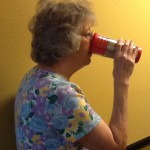 “Whew, I’m thirsty!” As temperatures rise, you may be saying that more frequently and for good reason. Better than one-half of our body weight is water and we lose water daily in sweat, urine, and feces. Water converts food into energy, regulates our body temperature, protects and cushions vital organs, and promotes regular bowel movements. In hot weather and during physical activity, it is easy to become dehydrated if we lose more water than we consume. Symptoms of dehydration include: difficulty swallowing, dry mouth due to low saliva production, headaches, fatigue, loss of appetite, dry eyes, muscle cramps, and kidney stones.
“Whew, I’m thirsty!” As temperatures rise, you may be saying that more frequently and for good reason. Better than one-half of our body weight is water and we lose water daily in sweat, urine, and feces. Water converts food into energy, regulates our body temperature, protects and cushions vital organs, and promotes regular bowel movements. In hot weather and during physical activity, it is easy to become dehydrated if we lose more water than we consume. Symptoms of dehydration include: difficulty swallowing, dry mouth due to low saliva production, headaches, fatigue, loss of appetite, dry eyes, muscle cramps, and kidney stones.
Most persons need six to eight cups of fluid every day. If you are eating high-fiber foods or taking a fiber supplement, taking certain medications, especially diuretics or “water pills,” engaging in vigorous physical activity, or the weather is hot and humid, you will need to increase your fluid intake. One-third of healthy persons 65 years or older have mild dehydration. If you have a senior adult in your life, encourage them to drink plenty of fluids to stay hydrated.
In addition to water, include these beverages regularly:
- Fruit juices – 100 percent juice, not a juice drink, which has added sugar. Six fluid ounces a day is enough.
- Low-sodium vegetable juices
- Low-fat or fat-free milk
- Vegetable or milk-based soups
Here are a few tips for adding more fluids:
- Start the day with a cup of water.
- Drink a cup of water about ½ hour before meals.
- Drink a full glass of water with your medications. This is best for most medications, but check with your pharmacist.
- Drink water before heading outdoors for yardwork or recreation. Thirst indicates fluid loss so drink before you feel thirsty. Take frequent water breaks during outdoor activity, especially in heat and high humidity. Drink one to two cups, or more if needed, of water during and after being outdoors.
- Fill a water bottle and carry it with your during the day.
- Eat “juicy” fruits, such as watermelon, peaches, cantaloupe, and honeydew. Chill for a refreshing treat.
What about sports drinks? Sports drinks contain water, sugar for energy, and electrolytes, including sodium, to replace those lost through perspiration. They promote fluid retention and tend to encourage fluid intake because of their taste. They are highly recommended during intense physical activities that last over one hour. For casual activities of less than an hour, water is a good choice for hydration. Be aware that beverages high in sugar, including fruit juices, can cause nausea or gastrointestinal distress. Caffeine or alcohol increase urine output and reduce fluid retention. Carbonated beverages can make you feel full, decreasing the amount of fluid you drink.
So stay hydrated this summer with healthy fluid choices to beat the heat!
Sources: Healthy Eating: Fluids
Casa, D.J., et al. Fluid Replacement for Athletes Journal of Athletic Training. 2000; 35(2): 212224.
- Check Your Coverage While the Sun is Shining - July 3, 2025
- Clean Up with Homemade Cleaners - April 28, 2025
- 5 Ways to Cool Your Power Bill - August 28, 2024
